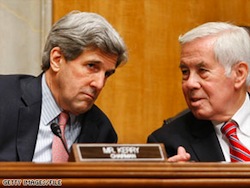It's Time to Ratify New START
June 29, 2010
Featured Image
Today's top nuclear policy stories, with excerpts in bullet form.
Stories we're following today, Tuesday, June 29, 2010:
A Strong Majority for New START - Joe Cirincione and Benjamin Loehrke in The Huffington Post [link]
- The New START treaty has passed its tipping point. The majority of living former secretaries of state, secretaries of defense, and national security advisors are now on record that New START strengthens U.S. national security.
- Last week, thirty national security luminaries enthusiastically gave their bipartisan support for the New START Treaty as a "necessary and appropriate step toward safeguarding our national security."
- With such overwhelming bipartisan support from America's top civilian and military officials and former national security leaders, it has been hard for the determined critics to scrape together experts beyond the fringe.
- The far right is simply having trouble objecting to what is an extremely reasonable and widely supported treaty with clear benefits for American national security.
- The Senate should bring the New START treaty to the floor before it breaks for August recess.
Obama Backs Away from Intergalactic Domination - Wired Danger Room [link]
- In the just-released National Space Strategy for the United States of America, Obama laid out a vision of a harmonious celestial order based around international cooperation for the advancement mutual interests.
- It represents a long tradition of U.S. presidential attitudes toward the celestial commons stretching back at least to the Carter era, as the Union of Concerned Scientists helpfully notes. Well, with one big exception: George W. Bush.
- “While the new Obama space policy does not directly support a treaty banning weapons in space as many in the international community have hoped, it does — in a 180 degree turn from the Bush administration policy — re-commit the United States to the open consideration of space arms control in language similar to the Reagan, Bush 1 and Clinton space policies. This is a positive move," said space policy analyst Theresa Hitchens.
Panetta Warns of Iran Threat - The Wall Street Journal [link]
- Central Intelligence Agency Director Leon Panetta said Iran has enough fissile material for two atomic bombs.
- The CIA chief's comments mark a further distancing of the U.S. government from a controversial 2007 National Intelligence Estimate that concluded Tehran had stopped developing atomic weapons in 2003.
- "I think [the Iranians] continue to develop their know-how," he said. Pressed on whether this included efforts by Iran to weaponize its nuclear program, Mr. Panetta responded: "I think they continue to work on designs in that area."
- Mr. Panetta said it would take Iran roughly a year to produce the highly enriched uranium needed for a nuclear weapon, once the decision was made to produce it.
- He said it would take an additional year "to develop the kind of weapon delivery system" needed to carry atomic warheads.
Inhofe: "Bipartisan Support for New START Means I Can't Show Up at the Hearings" - Nukes of Hazard Blog [link]
- At last Thursday’s Senate Foreign Relations Committee hearing on New START, he explained his absence at the previous nine hearings: "We’ve had…seventeen witnesses so far; no witnesses in opposition to it. I don’t know who thinks that can be reasonable."
- Inhofe continued that he could finally show up because the tenth hearing included two witnesses (Bob Joseph and Eric Edelman) whose questions about the treaty largely comported with his own.
- As you may recall, a day before the hearing our own John Isaacs published a nice little blog over at the Chain Reaction taking the good Senator to task for criticizing New START without bothering to show up for or ask a single question at any of the previous public hearings.
A View from the Cold War Vault
FBI Arrests 10 Accused as Working as Russian Spies - The Washington Post [link]
- FBI agents arrested 10 people on charges that they spent years in the United States as spies for Russia.
- The operation, referred to by U.S. investigators as "the Illegals program," was aimed at placing spies in nongovernmental jobs, such as at think tanks, where they could glean information from policymakers and Washington-connected insiders without attracting attention.
- Federal law enforcement officials portrayed their operation as a spectacular counterintelligence success that uncovered a group of spies capable of doing great damage to U.S. national security.
- But other officials said the Russian network appears to have accomplished little, if any, of its espionage aims, even though some of the suspects had lived in this country for up to two decades.



